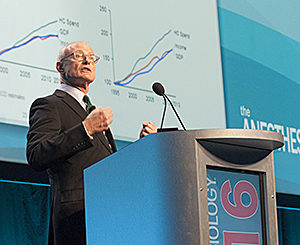
Michael Porter: ‘We are now on a path that will transform health care in a very positive way.’
Health care is moving toward a system of value-based reimbursement that is changing practice — to the consternation of some medical professionals. However, after many attempts to improve treatments and reduce costs, that push for value is clearly the way to go, according to Saturday’s Opening Session keynote speaker, Michael Porter, a leading professor of business strategy.
“We are now on a path that will transform health care in a very positive way,” Porter said. “I’m trying to help us all see a better way in health care to avoid bad outcomes.”
Keys in this transformation are to recognize that value is created around conditions and the measurement of outcomes — particularly around conditions. In addition, the best path for reimbursement for physicians is bundled payment because it focuses on care for a condition for the full cycle of care, said Porter, who is Bishop William Lawrence University Professor at Harvard Business School.
Past attempts to reduce costs in health care, such as consolidations, prior authorizations and electronic medical records, offered incremental improvements, but did not fix the overall problems.
“We can’t solve the problems of health care with incremental add-on solutions,” Porter said. “That has never worked. We have to change the structure of how we deliver health care and how we think about health care.”
The starting point in fixing the problem is to deliver value for the patient. That will require better outcomes that matter to the patient and are relative to the total cost of delivering those outcomes.
“If we can find a way to deliver care at a lower cost, we are succeeding. If we are not improving value, we are failing. We are starting to understand value is the central goal for all of us,” Porter said.
One of the reasons value is the right direction to follow is that it is a unifying goal for everyone — patients, physicians, insurers and government. However, value-based health care requires a new way of practicing medicine.
Value cannot be understood at the level of a hospital, a care site, a specialty or an intervention.
“You can’t calculate value for a hospital or a specialty. The hospital is meaningless. You can’t be about just your silo. We have to think about the whole process of care,” Porter said, adding that health care must reorganize into integrated practice units (IPUs) built around conditions. “Value is created around conditions, not sites, services or interventions. This is an epic change.”
As an example, he noted the treatment of patients with migraine headaches in Germany. Instead of patients bouncing from physician to physician for care, they are treated by a team focusing on the treatment of migraine headaches.
“What happens when we do this? In Germany, outcomes shot up literally the day after we created this new model,” Porter said. “Outcomes shot up and costs went down by 25 percent because the patients stopped going back and forth. The old models lead to duplication and waste.”
This model is being used in the U.S. at the University of Texas MD Anderson Cancer Center, where a team focuses on treating head and neck cancers. In Europe, Breast Center Certification requires that institutions treat a minimum number of patients to gain expertise and be recognized as an IPU. For less common conditions, teams may focus on more than one disease and use experts outside the institution affiliated with the institution.
There are two types of value-based reimbursement — capitation, such as ACOs, and bundled payment. Because bundled payment focuses on a full set of services needed over the cycle of treating a condition, it offers the best value while continuing to reward physicians, he said.
“What does that mean for anesthesiologists? You have to start thinking about conditions. Conditions will anchor you to value,” Porter said. “You can’t think that doing a little bit of everything is good. You have to focus on safety, but you have to think about outcomes. We have to stop protecting our traditional roles and do the things we do best.
“We need the society to be all over outcomes, measuring outcomes and building registries. Bundled payment is the way to preserve incomes and get credit for what we do.”
Return to Archive Index